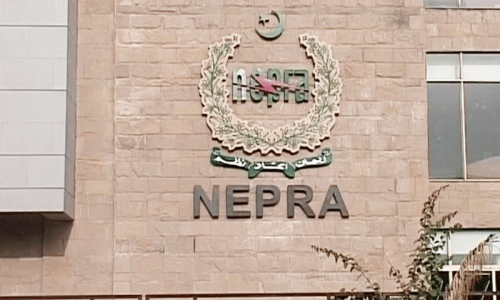• Okays up to 51pc hike in base rates, 184pc increase in fixed capacity charges
• Average residential tariff to rise by Rs3.63 per unit for July-Sept, Rs6.27 for remaining nine months
ISLAMABAD: Moving at a record speed, the National Electric Power Regulatory Authority (Nepra) on Thursday rubber-stamped all the government demands for an increase of up to 51 per cent in the national electricity base rates and up to 184pc in fixed capacity charges, with changes effective retrospectively from July 1, 2024.
The authority “has no objection in approving the motion along with the subsequent addendum of the federal government”, the power regulator said in the final order issued less than 24 hours after a public hearing on the issue. The new rates will be applicable across the country, including Karachi.
Similarly, the government’s request to apply fixed charges at 25pc of the sanctioned load or actual Maximum Demand Indicator (MDI) value for the month, whichever is higher, has also been approved, Nepra said.
In view of the requirements for the upcoming IMF programme, the regulator asked the power division to ensure notification of the approved tariff and revenue schedule of all the distribution companies (Discos).
The order said the total revenue requirement for the current fiscal year for Discos (excluding K-Electric) has increased to Rs3.768 trillion, resulting in an increase of Rs5.72 per unit (kilowatt-hour or kWh) in the average base tariff.
However, following public outcry, the federal cabinet moved an addendum. Under this addendum, instead of Rs5.72 per unit, “an (average) increase of Rs3.29 per unit is being passed on to the consumers from July to September 2024, and Rs4.55 per unit thereafter until June 2025”, particularly to provide some relief to residential consumers using up to 200 units.
Despite the tariff hike, the federal government would be picking up a tariff differential subsidy of around Rs490 billion, including Rs177bn for K-Electric and Rs313bn for the rest of the consumers across the country.
Overall, the average residential tariff has gone up by Rs3.63 per unit or 14pc for July to September and 24pc (Rs6.27per unit) for the remaining nine months.
The highest average per-unit increase of Rs8.04 per unit (22pc) has been allowed for commercial consumers, followed by Rs6.98 per unit (18pc) for general services.
Industrial tariff would be lower by 2pc or 68 paise per unit. Average increase of Rs6.62 per unit or 24pc has been allowed for agriculture consumers and Rs5.51 per unit (16pc) for bulk consumers.
But the devil lies in the slab-wise details. For example, while the electricity rates would remain unchanged for consumers — both protected and non-protected — using up to 200 units till September, even the tariff would jump by 51pc for “protected consumers” using up to 100 units per month and 41pc for protected consumers using up to 200 units per month. More than 15.5 million consumers fall in this category.
Among the non-protected category, the biggest increase of more than 43pc or Rs7.12 per unit to Rs23.6 per unit has been allowed for the first 100 units, involving another 5.95m consumers, on the expiry of a three-month freeze.
This would be followed by 31pc and 27pc increase in rates (Rs7.12 per unit each) for the 101-200 and 201-300 slabs to Rs30.1 and Rs34.25 per unit, respectively. Another five million consumers fall into these two categories.
Consumers falling in the next five household categories, ranging from 300 units and above, would face 14pc to 22pc increase (Rs6.12 per unit each) but they would be simultaneously subjected to a new fixed capacity charge of Rs200-1,000 per kilowatt capacity depending on the sanctioned load. This is the first time that these domestic consumers will be paying fixed charges irrespective of consumption.
On the other hand, fixed charges for agricultural consumers have been doubled to Rs400 per unit from Rs200 earlier and their tariff increase would range between 19-44pc (about Rs5.75 to Rs6.59 per unit).
Fixed monthly charges for commercial consumers have been increased by 150pc to Rs1250 per unit from Rs500 earlier. Likewise, fixed charges for various categories and industrial and bulk consumers have been raised to Rs1,250 per unit from Rs440-500 earlier.
On top of the capacity charge increase, commercial and general services tariff has gone up by 17pc (Rs5.89 per unit) to about Rs44.
The regulator justified the fixed charges increase, saying the capacity charges of generation companies and transmission network were fixed costs, required to be paid periodically, irrespective of electricity consumption by the consumers. These fixed costs account for around 70pc of the total revenue requirement of the distribution companies.
“However, the present consumer-end tariff design is volumetric in nature, whereby around 96pc of the total system cost is recovered on the units consumed (rupee per kWh) and the remaining 4pc as a fixed charge per kilowatt per month. Thus, there is a mismatch between the incurring of cost (fixed in nature) and its recovery mechanism (consumption-based),” the regulator said.
It said the National Electricity Plan provided that fixed charges shall be progressively incorporated in the tariffs of all consumer segments, which shall account for at least 20pc of the fixed cost. It claimed that the “impact of the increase in fixed charges was offset by a reduction in variable charges (consumption-based) of different categories of consumers”.
Nepra said most consumers demanded that the tariff rebasing take effect from the date of notification, but it “agrees with the request of the Ministry of Energy to apply the tariff with effect from July 1, 2024”.
Published in Dawn, July 12th, 2024















































